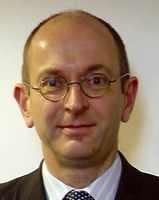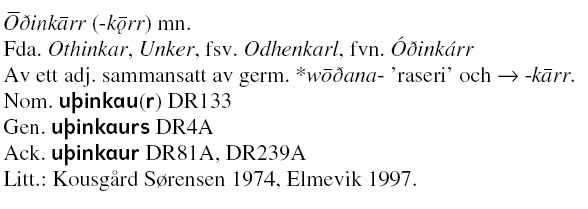e-Onomastics in Sweden (part 1)
e-Onomastics in Sweden is concentrated mostly in Uppsala around the
Swedish Institute for Language and Folklore
From Wikipedia: http://en.wikipedia.org/wiki/Swedish_Institute_for_Language_and_Folklore
The Institute for Language and Folklore (Swedish: Institutet för språk och folkminnen, but commonly referred to by the acronym SOFI) is a Swedish government agency with the purpose of studying and collecting materials concerning dialects, folklore and
onomastics.
In June 2006 the Swedish government decided to centralize the Swedish language preservation institutes, starting on the July 1, 2006. The former name,
Swedish Institute for Dialectology, Onomastics and Folklore Research (Swedish: Språk- och folkminnesinstituet) was changed to the current name.
The institute consists of several, originally independent, units, located in different Swedish university towns. The central unit of the institute is located in
Uppsala, with other departments located to Lund, Gothenburg, Umeå and Stockholm.
The institute is, among other things, responsible for the ongoing publication of
Sveriges ortnamn (a dictionary of all Swedish placenames) and
Sveriges medeltida personnamn (a dictionary of medieval Swedish personal names).
Units of the Institute:
Administrative Unit (Uppsala)
Department of Dialectology, Uppsala (Dialektavdelningen, DA)
Folklore Department, Uppsala (Folkminnesavdelningen, FA)
Phonogram Unit, Uppsala (Fonogramenheten)
Department of Onomastics, Uppsala (Namnavdelning, NA).
Archive for Dialects,
Placenames and Folklore in Gothenburg (Dialekt-, ortnamns- och folkminnesarkivet i Göteborg, DAG)
Archive for Dialects and
Placenames in Lund (Dialekt- och ortnamnsarkivet i Lund, DAL)
Swedish Language Council (Språkrådet)
Archive for Dialects,
Placenames and Folklore in Umeå (Dialekt-, ortnamns- och folkminnesarkivet i Umeå, DAUM)
Therein we can find very interesting projects concerning among others antroponyms.
Dictionary of Proto-Norse personal names (ca. 0 - 700)
from here: http://www.sofi.se/servlet/GetDoc?meta_id=1465
Dictionary of Proto-Norse personal names is an alphabetical dictionary of the personal names found in sources from the period around the birth of Christ to about 700 AD.
The sources are:
Primitive Norse runic inscriptions
Nordic -
lev - names
the Old English from the poem Beowulf
The dictionary is only available as electronic version: http://www.sofi.se/images/NA/pdf/urnord.pdf
Runestone from Northern Vånga rectory, Vara Municipality (vg65).
Photo: Hakan Dahlin, Mariestad.
Lexicon of Runic Names (ca. 700-1100)
http://www.sofi.se/servlet/GetDoc?meta_id=1765
This database contains the names of the Viking Age people.
The number of entries is about 1.880, including references.
The number of articles on individual names is approximately 1530, of which about 130 are alternative interpretations. The ratio between male and female names are about 3:1. In addition to articles on individual names the dictionary provides articles on names with lists of testified compositions. The number of such items is about 160. There are also some names for which the articles are not given as they occur with only occasional evidence of properhood.
Dictionary of Swedish Medieval Personal Names (ca. 1100-1520)
From here (translated by me) http://www.sofi.se/1226
Project
Swedish medieval personal names (SMP) has two main objectives: first, to create a database for research, and second, to make it available for the public as a part of the historical heritage. This is done primarily through the issuance of a dictionary of the Swedish medieval personal names. The dictionary is provided both as a printed book and online publication.
The dictionary deal with all personal names, both first name and bynames, which in the Middle Ages have been used in Sweden within its present borders and in Finland, with the exception of pure Finnish names. Even the names of such old Norwegian provinces as Bohuslän, Jämtland, Härjedalen and Gotland have been included. As well as Denmark's old names from Skåne, Blekinge and Halland.
Detail from a mediaeval tomb (ca. 1330) in the Västeråkers Church (Uppland)
Detalj från Ramborg Israelsdotters grav, Västeråkers kyrka, Uppland. Foto: Maria Ohlsson.
The project is based on the extensive collections of medieval personal names. Since 1943, several generations of students and staff of the project in question have collected nearly a million names from all known historical documents (manuscripts, letters, land records and church rolls from 1100 until about the 1520th) After the late Middle Ages tax rolls were full with a myriad of names because citizens came to pay their taxes. In addition, there is a representative selection from the 1500 century land records. The main focus has consistently been to collect various onomastic forms from manuscripts of that time.
SMP began in 1943, from 1947 the project has been carried out by the Royal Academy of Literature, History and Antiquities and became a governmental project only in 1984. Since 1998, SMP Name Archives are to be found in Uppsala within the Institute for Language and Folklore. For example:
Team working on the Dictionary of Swedish medieval personal names is looking like that:
Mats Wahlberg (Chair), Director of Research
Names Archives in Uppsala, Institute for Language and Folklore
tel: 018-65 21 80
Thorsten Andersson, Professor Emeritus
Seminar for Nordic names Research, Uppsala University
Roger Axelsson, Editor
National Archives, the Swedish biographical dictionary, Stockholm
Goran Dahlbäck, Professor Emeritus
Department of History, Stockholm University
His Gillingstam, file. PhD, former editor of
National Archives, the Swedish biographical dictionary, Stockholm
Lena Peterson, professor emeritus
Seminar for Nordic names Research, Uppsala University
Sara Risberg, File. Dr.
The National Archives, Swedish Diplomatarium, Stockholm
Svante Strandberg, professor emeritus
Seminar for Nordic names Research, Uppsala University
Per-Axel Wiktorsson, Professor Emeritus
School of Humanities, Education and Social Sciences, Örebro University

















































